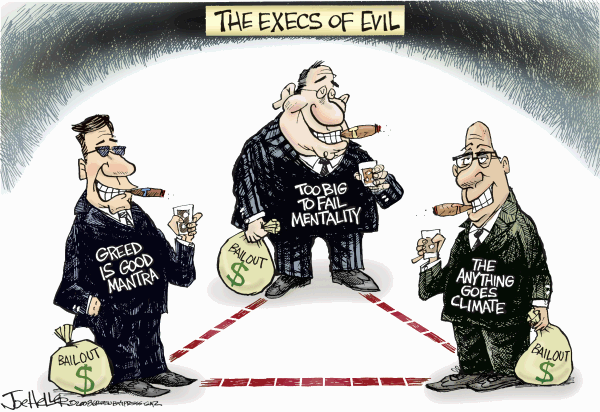Search
Democracy Links
Member's Off-site Blogs
rooted cause analysis .....

Harvard Business School, stung by criticism that it has not prepared alumni to cope with the economic meltdown, will dissect its performance using a practice it employs to examine corporations in crisis.
A taskforce, created in November at the direction of the dean, Jay Light, is writing a case study to scrutinise whether the school is failing to teach students to understand and manage risk in the current environment, said Paul Healy, the co-chairman of the panel.The case study method is the technique Harvard uses to analyse decision-making by executives during times of duress.
Harvard Business School's 219 professors will tackle the case at a May 27 meeting and may use the discussion to propose curriculum changes. "We'll put them in the students' seats," Healy, a professor of business administration, said.While officials at the business schools of Stanford University and the Massachusetts Institute of Technology say they have developed classes and projects to address the causes of the crisis, Harvard is using the collapse as an opportunity for self-reflection. The professors will ponder how the school's reputation has been tarnished, and may debate articles critical of the institution and its graduates who helped trigger the financial crisis, Healy said.
Harvard's alumni include Stanley O'Neal and John Thain, the former chief executive officers of Merrill Lynch who presided over the company's decline; Rick Wagoner, the ousted chief of General Motors; and Christopher Cox, the former chairman of the US Securities and Exchange Commission."I'm sure the brand is damaged, at some level," Healy said. "People that I know well tell me to my face, 'You guys have some culpability,' and I think that's fair. It's a good time for us to reflect and think about what the right things are for us to be doing."
Professors may spend half a day meeting in groups of about 90, said Healy, who added the plans were not final. The last time the school overhauled its curriculum was in 2004, when it introduced a required ethics course after the 2001 Enron accounting fraud.The new series of seminars at the school help "students discover and defend their values", Dean Robert Joss said in an article for Stanford Business magazine's next issue. Classes include "Understanding Cheating," which looks at why people make unethical decisions.
Harvard business degrees are now "scarlet letters of shame", wrote Philip Delves Broughton, a 2006 graduate of the school, in a March column in the Sunday Times of London. "Time after time and scandal after scandal, it seems that a school that graduates just 900 students a year finds itself in the thick of it."http://business.smh.com.au/business/harvard-study-turns-tables-on-its-own-mbas-20090403-9q7e.html
- By John Richardson at 4 Apr 2009 - 9:04pm
- John Richardson's blog
- Login or register to post comments
Recent comments
19 hours 41 min ago
21 hours 7 min ago
21 hours 13 min ago
23 hours 44 min ago
1 day 17 hours ago
1 day 17 hours ago
1 day 18 hours ago
1 day 18 hours ago
1 day 19 hours ago
1 day 21 hours ago